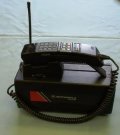I was in the telecoms business when mobiles first came out, they cost a fortune back then not just for the phone but the airtime rental and call cost, if my memory serves me correctly £25 a month for airtime and up to 50p a minute for calls
These days the phones are cheap, unless you queue up every six month for the new Apple product, one thing that was much better in the early days was if someone called your phone it would ring until you either answered or they hung up, which gave you the chance to answer, unlike these days where is whips off to voicemail, which I know you can opt out of, but that defeats the object, yet network providers will only allow 30 seconds to answer the phone before it heads of to voicemail
These days the phones are cheap, unless you queue up every six month for the new Apple product, one thing that was much better in the early days was if someone called your phone it would ring until you either answered or they hung up, which gave you the chance to answer, unlike these days where is whips off to voicemail, which I know you can opt out of, but that defeats the object, yet network providers will only allow 30 seconds to answer the phone before it heads of to voicemail



